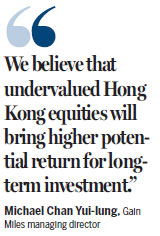Inflation, stocks chaos sour MPF earnings
Updated: 2016-01-07 08:21
By Oswald Chan in Hong Kong(HK Edition)
|
|||||||
|
A stockbroker talks on the telephone at a securities brokerage in Hong Kong. MPF performance in 2015 was dragged down by the unfavorable performance of equity markets on both the mainland and across Asia, but some experts still expect a bullish market in 2016. Parker Zheng / China Daily |
MPF contributors lost an average of HK$6,248 in 2015, but return in 2016 seen to rise on bullish stocks outlook
Continued volatility in Hong Kong's equity markets and the city's soaring inflation rate in the past five years have had a chilling effect on employees' investments under the Mandatory Provident Fund (MPF).
Each MPF contributor lost an average of HK$6,248 last year as investments yielded a negative 3-percent return rate, according to MPF advisory firm Gain Miles.
As at Nov 30, 2015, the average MPF return was a negative 2.4 percent, against a 2.19-percent rise in the consumer price index (CPI). Between November 2010 and November last year, the CPI went up 23.14 percent while MPF returns managed to rise by just 12.56 percent.
MPF performance in 2015 was dragged down by the unfavorable performance of equity markets on both the mainland and across Asia. The Convey MPF Composite Index, which tracks annual MPF returns, fell 0.43 percent year-on-year to 190.22, indicating that annual MPF investment returns are likely to decline.

"As equity markets had expected the US to raise interest rates before it actually did in December, there had been capital outflows from Asian markets back to the US, causing the Hong Kong stock market to underperform, thus dragging down MPF performance last year," Gain Miles Managing Director Michael Chan Yui-lung said on Wednesday.
The city's benchmark stocks gauge retreated 7.1 percent in 2015 - the biggest fall since 2011 - while the Hang Seng China Enterprises Index, which tracks H shares, tumbled 19.4 percent last year.
Investors have stayed away from stocks of mainland firms listed in Hong Kong due to weak economic growth and growing market volatility on the mainland equity markets. A weaker yuan has also cut the value of corporate earnings by H shares, which are priced in Hong Kong dollars.
Looking ahead, Gain Miles said it expects MPF funds to bestow an annual return rate of 4 to 5 percent in 2016 as the company remains bullish on the local stock market.
"We believe that undervalued Hong Kong equities will bring higher potential return for long-term investment, while equities in developed markets will continue to benefit from the accommodative monetary policies of central banks," Chan reckoned.
Kenrick Chung, MPF business development director at Convoy Financial Services, warned that MPF contributors should be on the alert for market movement resulting from counter measures implemented by different economies. But he agreed that Hong Kong shares and mainland stocks listed in the SAR will offer long-term investment potential.
oswald@chinadailyhk.com
(HK Edition 01/07/2016 page8)
